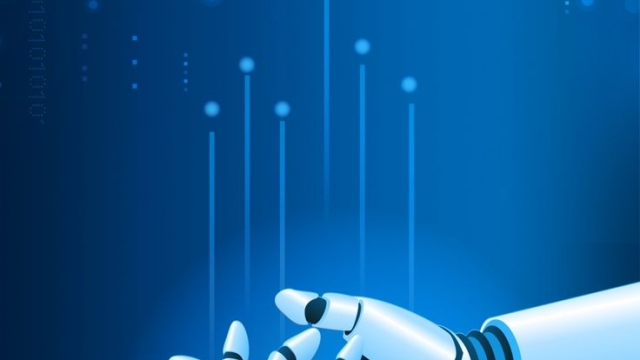
Artificial Intelligence, the fascinating realm where machines are designed to possess human-like intelligence and abilities, has been steadily emerging as a revolutionary force that has the potential to reshape our world. With rapid advancements in technology, we find ourselves at the cusp of an era where intelligent machines are no longer just science fiction, but a present reality. From self-driving cars to autonomous robots, from virtual personal assistants to smart home devices, artificial intelligence is permeating various aspects of our everyday lives, augmenting our capabilities, and providing us with unparalleled convenience.
At its core, artificial intelligence aims to replicate and surpass the cognitive abilities of humans, enabling machines to think, reason, learn, and adapt. This pursuit of creating intelligent systems has been fueled by the vast amount of data now available and the untapped potential lying within it. Machine learning algorithms, neural networks, and deep learning techniques are the building blocks of this new age of intelligence. Through pattern recognition, data analysis, and iterative learning processes, these systems have the power to generate insights, make accurate predictions, and engage in complex decision-making tasks.
As our reliance on artificial intelligence continues to grow, so does the impact it has on various industries. From healthcare to finance, from manufacturing to entertainment, the transformative potential of AI is being harnessed to improve efficiency, enhance productivity, and unlock new possibilities. The ability of machines to process and analyze vast amounts of data in real time enables us to uncover hidden patterns, optimize processes, and make more informed decisions. This opens up opportunities for breakthroughs in medical diagnoses, personalized marketing, financial forecasting, and more.
However, as we venture deeper into the realm of artificial intelligence, there are also important questions and considerations to be addressed. The ethical implications of AI, including issues of privacy, security, and algorithmic bias, require careful attention. As machines become more autonomous and their decision-making powers increase, the need for transparency and accountability grows alongside. Striking a balance between the immense potential of AI and ensuring its responsible deployment is integral to shaping the future of this intelligent revolution.
While we cannot predict with certainty how artificial intelligence will unfold, one thing is clear: the rise of intelligent machines is fundamentally changing the way we interact with technology and the world around us. By augmenting human capabilities and providing us with unprecedented opportunities, artificial intelligence has the potential to redefine the boundaries of human achievement. As we embark on this journey into the wonders of AI, it is crucial to navigate the path ahead with caution, curiosity, and a commitment to harnessing its power for the betterment of society.
Understanding Artificial Intelligence
Artificial intelligence (AI) refers to the development of computer systems that possess the ability to perform tasks that typically require human intelligence. AI is a branch of computer science that focuses on creating machines capable of learning, reasoning, and making decisions. The field of AI aims to replicate human-like intelligence in machines, enabling them to understand, analyze, and respond to complex information and tasks.
One of the main components of AI is machine learning, which involves training computer systems to learn and improve from experience without explicitly being programmed. Through the use of algorithms, machines analyze and interpret vast amounts of data to identify patterns and make predictions. This ability to learn from data empowers AI to adapt and improve its performance over time.
AI technology encompasses various subfields, such as natural language processing, computer vision, and robotics. Natural language processing allows machines to understand and interact with human language, enabling applications like speech recognition and language translation. Computer vision focuses on enabling machines to perceive and interpret visual information, enabling applications such as image recognition and object detection. Robotics integrates AI to create intelligent machines that can perform physical tasks with precision and autonomy.
The potential applications of AI are vast and span across multiple industries. From healthcare to finance, AI is revolutionizing the way we approach complex problems and improve efficiency. In healthcare, AI systems can analyze medical data to assist in diagnosis, recommend treatment plans, and even predict patient outcomes. In finance, AI algorithms help analyze vast amounts of financial data to detect patterns, predict market trends, and automate trading strategies.
As AI continues to advance, its impact on society and the workforce is a topic of discussion and debate. While AI offers immense potential, ethical considerations and the need for responsible development are vital to ensure its beneficial and responsible use. Despite challenges and concerns, the rise of intelligent machines through artificial intelligence presents exciting opportunities to enhance our lives and shape the world we live in.
Applications of Artificial Intelligence
Artificial intelligence, the groundbreaking technology that simulates human intelligence in machines, is revolutionizing various sectors and industries. Its wide range of applications has transformed the way we live and work. In this section, we will explore some of the key areas where artificial intelligence is making significant advancements.
-
Healthcare: Artificial intelligence is playing a crucial role in the healthcare industry, with its ability to analyze massive amounts of medical data quickly and accurately. AI-powered systems have the potential to assist doctors in diagnosing diseases more effectively, identifying patterns in patient data, and recommending personalized treatments. Furthermore, medical imaging technologies supported by artificial intelligence algorithms can aid in the early detection of diseases such as cancer, significantly improving patient outcomes.
-
Finance: The financial sector has embraced artificial intelligence to enhance efficiency and mitigate risks. AI-powered algorithms can analyze vast amounts of financial data, detect fraudulent activities, and make data-driven investment decisions. Additionally, chatbots equipped with natural language processing capabilities are being deployed to provide real-time customer support and personalized financial advice. These advancements in artificial intelligence have streamlined operations, reduced costs, and improved customer experiences in the finance industry.
-
Transportation: The transportation industry is undergoing a technological revolution, largely driven by artificial intelligence. Self-driving cars, enabled by AI algorithms and sensors, promise to transform our roads by enhancing safety and efficiency. Moreover, AI-powered traffic management systems can monitor and optimize traffic flows, reducing congestion and saving travel time. By leveraging artificial intelligence, the transportation sector is moving towards a future of autonomous vehicles and smarter, more sustainable infrastructure.
In conclusion, the applications of artificial intelligence span various sectors, empowering industries to achieve unprecedented advancements. From healthcare to finance to transportation, artificial intelligence is shaping the way we live and interact with technology. As this technology continues to evolve, we can expect even more innovative applications that will further propel us into the realm of intelligent machines.
Ethical Considerations in Artificial Intelligence
Artificial intelligence (AI) has brought about unprecedented advancements in various fields, enhancing efficiency, convenience, and productivity. However, as AI continues to evolve, it is crucial to address the ethical considerations that come along with this technology.
One key ethical consideration is privacy. With the capabilities of AI systems to collect, analyze, and process vast amounts of data, there is a potential risk of infringing upon individuals’ privacy rights. It is essential to establish strict protocols and regulations to ensure that personal information is safeguarded, and data usage is transparent and consent-driven.
Another significant ethical concern revolves around the potential biases embedded in AI algorithms. If these systems are trained on biased or discriminatory data, they can perpetuate and amplify societal biases, leading to unfair outcomes. Steps must be taken to address this issue, such as diversifying the datasets used for training and implementing regular audits to detect and mitigate bias.
A further ethical consideration in AI is the impact on employment. While AI has the potential to automate various tasks, it can also result in job displacement and unemployment for certain industries and professions. Society needs to proactively address this challenge by promoting reskilling and upskilling programs to ensure individuals have opportunities to adapt to the changing job landscape.
In conclusion, as artificial intelligence continues to advance, it is vital to prioritize the ethical considerations associated with this technology. Addressing issues such as privacy, bias, and employment will be crucial in ensuring the responsible and equitable use of AI for the betterment of society.









